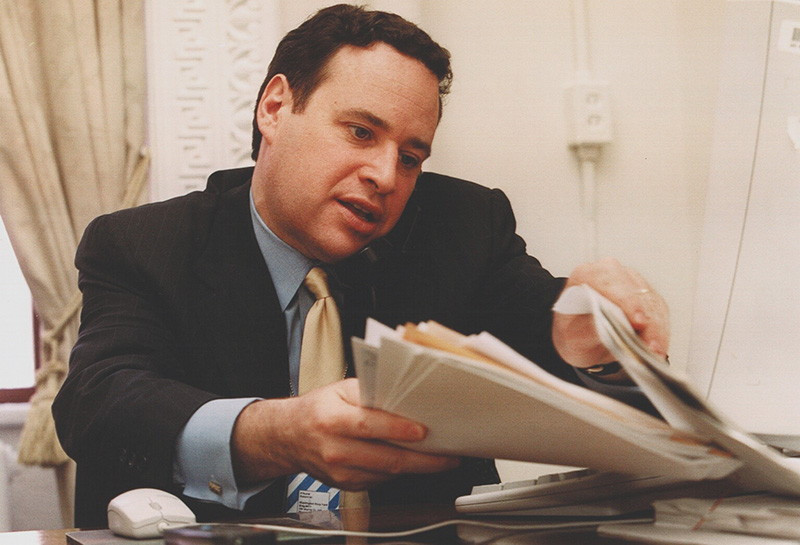Rethinking Republican
David Frum has a wake-up call for the American right
The reelection of Barack Obama in November 2012 proved a two-sided coin in American political life.
Not only did it usher in another four years of Democratic power, it decisively hobbled the Republican Party that, humiliated by the defeat of Mitt Romney, faded into a realm of obscurity not experienced in decades.
Such a paradigm shift in U.S. society can be attributed not solely to Obama’s seemingly robust public image and popularity among young voters, but to the dramatic rightward shift of the Republican Party and its disconnection from numerous bases of support.
From what many describe as a failure to compromise on policies such as the Affordable Care Act (otherwise known as the PPACA or Obamacare) and issues pertaining to foreign affairs, the Tea Party-abetted Republicans have found themselves in a more difficult spot than ever - and enmeshed in a difficult struggle of redefinition.
To David Frum, journalist, political commentator, author and former speechwriter for George W. Bush, the Republicans need to act (and fast) to regain legitimacy and earn a rightful place amid an American culture they largely helped to define.
“On the Republican side, you see them still stunned by the unexpected defeat in 2012,” said Frum, speaking with The Uniter in advance of his appearance at the University of Winnipeg on Wednesday, March 6 as part of The Uniter Speaker Series.
“They’re still looking for their footing, and when their leaders don’t have much authority and prestige, the party is only at the very beginning of the process of rethinking. It’s broken.”
Coming off the release of his latest work, an ebook titled Why Romney Lost, the Daily Beast columnist and frequent CNN contributor offered his insights into a party he has represented and worked with for decades.
Originally hailing from Toronto, Frum has resided in Washington, D.C. since 1996, publishing editorial columns for Newsweek, The Week and Canada’s National Post, while founding a successful political blog at FrumForum.com.
A long-time and self-described “conservative Republican,” Frum is the vice-chairman of the R Street Institute, a major U.S. think tank, and former fellow of the American Enterprise Institute - a position he lost in March 2010 after comments criticizing the Republican approach to health care reform.
Now, Frum is focused on the future - not only of his own career, but that of the party he has supported since a young adult working on the Reagan campaign.
“Today the Republican Party is still much more committed to defending the interests of the voters and constituencies it’s got, instead of appealing to bigger audiences,” he said.
“In the debates over fiscal policy, the Republican Party continues to think about the concerns of older, more affluent voters, and not enough about young people and the middle class.”
Frum’s concerns are rooted primarily in what he sees as the “most striking aspect of U.S. politics” - a lack of economic thinking.
To him, the Republicans are still preoccupied with fiscal policies reflective of the Reagan era, a time when totally different issues were at play.
“Supply-side economics (lower taxes and economic regulation) responded to problems in the 1970s,” Frum said. “Those economists said, when coping with inflation and slow productivity growth, the right thing to do is to cut marginal taxes.
“The problem with the Republican message is that we’re advocating solutions for problems that don’t exist (just) because they once worked under completely different circumstances. It’s not a denial of the Reagan and Thatcher years, but it’s a call to do something different.”
Frum is among a small number of dissenting voices within the American right that have responded to a series of poor choices made by Republicans in a callow fight against Democrats over issues that require compromise.
“ In the debates over fiscal policy, the Republican Party continues to think about the concerns of older, more affluent voters, and not enough about young people and the middle class.
David Frum
A recurring theme in many of his writings reflects this: a need to work across party lines to achieve policy changes, and a separation from the discrediting allure of sensationalist rightist media outlets such as Fox News.
“The Fox News election night performance has had an impact,” he claims. “We’ve seen a decline in ratings and they aren’t replacing their audience. ... It’s aging and culturally out of style, but there are moments where truth confronts you.”
While Frum believes the “political system has become a source of economic risk,” he is not reticent to express optimism and identify positive changes ahead.
“After the election of 2008, we saw a freezing of Republican and Democrat ideals, but now we’re seeing a thaw. It’s early days yet, but I believe we are seeing some new signs of openness.
“The first job, as we leave behind the crisis, is to come up with policies that counteract the tendency of the modern economy to reward people at the very top. Because even before the contraction, the average U.S. family was not benefiting from the existing policies.”
Frum acknowledges the inherently decentralized political apparatus in the U.S. and how that structure protracts change, but also identifies changing political attitudes as well.
“There is way too much emphasis on who in politics, and not what” he said. “That is, politicians alone can’t solve the problems and single-handedly repair the party. You need many, many more people.”
Ahead of his talk at the University of Winnipeg, Frum expressed excitement about connecting with students.
“I want to sketch out and explain the reasons for optimism in the political system. I want to explain how it’s relevant, and importantly, suggest how it could be better.”
The Uniter Speaker Series presents David Frum on Wednesday, March 6 at 7:30 p.m. in Convocation Hall at the University of Winnipeg. The talk is open to everyone and admission is free. Visit www.uniter.ca/speakers-series.
Published in Volume 67, Number 21 of The Uniter (February 28, 2013)








